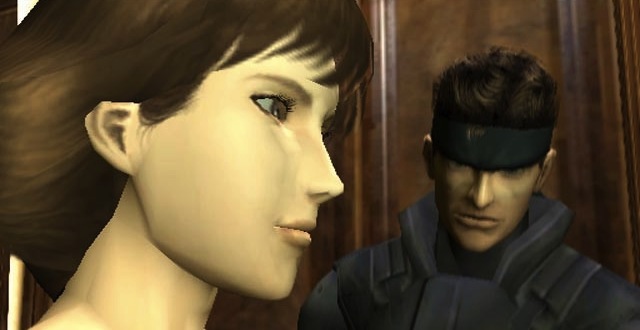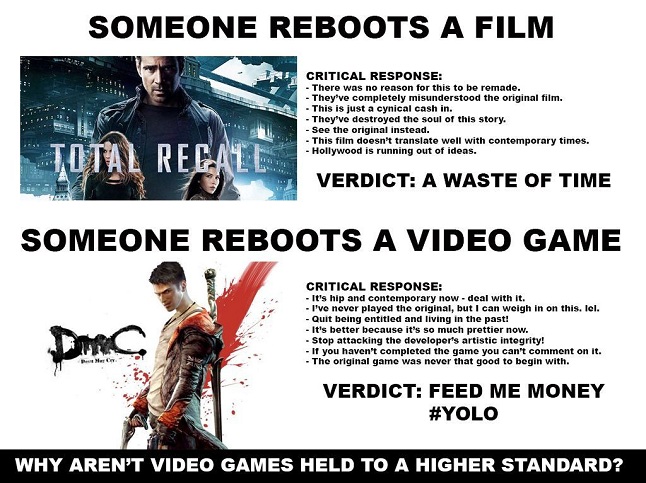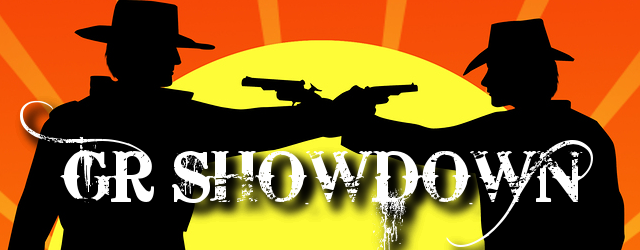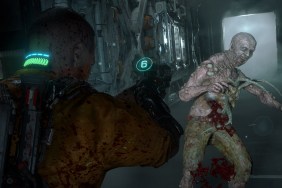GR Showdown pits the Game Revolution staff against each other in a passionate debate on a particular hot-button gaming topic. Our self-imposed rules? There is no middle ground—all must take a side. All debates will have an equal number of representative on both sides: either 1-on-1 or 2-on-2 . And all our arguments must be made in 350 words or fewer; 500 or fewer, if it's 1-on-1. Which side are YOU on?

Yes – Anthony
Oh God, yes—there are way too many in my opinion. Although it seems to have died down a little bit, about midway through this console generation it was a welcome trend that quickly became over-saturated and bloated. There were remakes of originals, HD remakes, and so many classic franchises that tried to reinvent the series with a reboot—but all they deserved was a swift boot to the ass.
Let’s be frank here, it’s a sound investment selling or—in the cases of HD remakes—re-selling games and series that have a proven track record of sales over, say, risking a fortune on a new IP. And with the HD remakes, there’s the added gloss of nostalgia for those that experience the games in the past, or for those that hadn’t, the appeal of finally finding out what all the hoopla was about. But all it really amounted to, in my eyes, is a lack of creativity and testicular fortitude. Balls, my friends—these publishers don’t have them, and instead took the “safe” approach and re-released the same goddamn thing again.
And what has happened to this industry? We’ve seen such a major split. There’s the hugely popular annual franchises that sell millions. Then there’s cheap iOS and indie games that innovate, make short dough off their even shorter investment, and they build from there. Somewhere in the middle, are those same franchises that failed to innovate enough to stay relevant. Taking the easy route doesn’t always make for a winner.
Take Tomb Raider, for example. Great game, a well-done reboot, yet it didn’t sell to Square Enix’s lofty expectations and failed to make back the money invested. Why? Because even though this is a rebooted Lara Croft in an origins story, it’s still fucking Tomb Raider—and it’s the fourteenth entry in the series in addition to movies, and God knows what else. People don’t want more of the same unless it’s Call of Duty. In that case, they’ll take the same goddamn thing again and again.
Still, there are a few of the more obscure games that I’d love to see remade from the ground up. Some games, like the GameCube Resident Evil remake or Metal Gear Solid: Twin Snakes, were shining examples of remakes done right. The main difference between those, though, were that there were very few remakes around that time, and these were remakes of some of the biggest and best games of all time—which is very different from having three Hitman games from the previous gen with Agent 47’s bald head spit-shined in HD to get a few extra sales out of those who were excited about Absolution. And guess what? They’re both selling for under a quarter of what the retail asking price was when the released. Lesson learned?

No – Alex
Anthony, while I totally agree with you on the HD collection front (I mean seriously, how many up-resed PS2 games do we need?), I do think that there is an excellent case to be made in support of reboots. You bring up Tomb Raider, and I have to disagree with your assessment on why it failed to live up to Square Enix's lofty expectations. The game sold 3.6 million copies in its first month, so saying that game's inability to deliver on Square's expectations of 5-6 million (which is astronomical by the way) is an indication of franchise fatigue is downright incorrect.
No, instead Square Enix mismanaged their budget and spent far too much in marketing. 3.6 million copies is nothing to scoff at. If anything, it proves that gamers are willing to pay for high-quality reboots. The publishers funding these games just need to better manage their money and not point the finger at their Western studios in an effort to hide the fact that their domestic development teams can't deliver. Seriously, Square, you can only complain once you've released Versus XIII.
Would it have been better if Crystal Dynamics continued to pump out Tomb Raider games like they had been before? Sure, Guardian of Light was an intriguing departure, but it was hardly enough to hide the fact that the franchise had been growing incredibly stale, and let's face reality: There's absolutely no way the studio would just sit on such an iconic series and pursue something completely new. Financial drama aside, the Tomb Raider reboot was precisely what the series needed, reinvigorating longtime fans and reeling in newcomers.
Now let's talk about Metal Gear Solid: Twin Snakes. I'm so glad you brought this game up, Anthony, as it is easily one of my favorite games of all time and likely holds a similar place in your heart as well. The leap in visual fidelity made all the difference in such a cinematic game thanks to vastly superior technology. You see, I don't think the problem is that we're seeing too many remakes, but rather the wrong ones. No, Square, we don't need to play Final Fantasy X with slightly sharper character models. What we want is a completely overhauled, modern day take on Final Fantasy VII.
Even what Nintendo did with Ocarina of Time on 3DS is an excellent example of a remake done right. In fact, the Big N did such a good job that I'm far more excited to see a Majora's Mask remake for the handheld than the recently announced A Link to the Past sequel. Give me more remakes and reboots; just take the time to do them right and manage your budgets accordingly.

Nick – Yes (But Hopefully No Very Soon): Innovation is a fickle desire. Gamers say they want to see new ideas in video games, but when the landscape is filled with numerous sequels, remakes, and reboots – many of which rake in the sales numbers that publishers are looking for – I can't help but feel that this really isn't a major priority. Perhaps this is a social phenomenon strangely analogous to the Pareto Principle, but I believe what people truly want is 20% innovation and 80% familiarity. And that's why there are way too many remakes and reboots in the market.
Sure, we can explore the multiple causes behind this: the ever-growing influx of retro gamers who crave nostalgia, the struggling economy that has seen publishers and developers playing it safe just to survive, and consumers who have tighter wallets and want a game that they can play with friends and that will last longer than a month.
My particular stance as a critic, though, tends to put me at odds with the business side of the game industry, because I would rather see an interesting idea than an established one. Ideally, I want 50% innovation and 50% familiarity. Video games don't grow by repeating history; remakes and reboots might sustain the industry, but it also causes stagnation.
The question isn't whether remakes and reboots are themselves bad, because there are plenty of examples and counterexamples. Mortal Kombat and Tomb Raider are both strong reboots, whereas Splatterhouse and Medal of Honor are not. Likewise, The Legend of Zelda: Ocarina of Time 3D and the Gamecube remake of Resident Evil are solid remakes, but Silent Hill: Shattered Memories and GoldenEye 007: Reloaded are not.
The question is whether there are too many of them, and despite the current socio-economic landscape, I believe so: The Legend of Zelda: Wind Waker HD, Thief, Flashback, Final Fantasy X HD, Metal Gear Solid: The Legacy Collection, Dungeons & Dragons: Chronicles of Mystara, Kingdom Hearts HD 1.5 ReMIX, and Wolfenstein: The New Order. And those are only the ones I know about. I haven't even included re-releases, ports, and annualized sequels.
Against the sum of those figures, the list of new IPs are relatively few… at the moment. I hope that with the arrival of the next-generation consoles at E3 comes a torrent of surprises, with some that will change video games as I know it. You know, a "game revolution" and all that.







